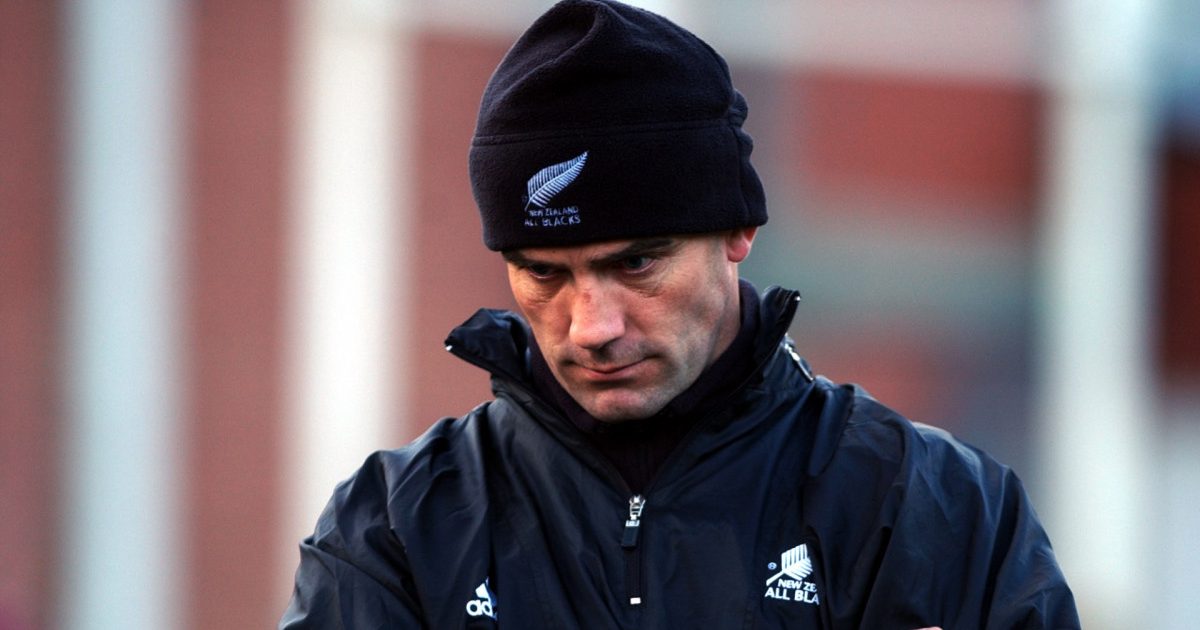'When I was here 20 years ago I had the chance to stay on as well and I went back to New Zealand probably too early'

John Mitchell has suggested the feeling there is unfinished business with England was the reason why he signed a contract extension this week, not only because they failed to finish the job at the 2019 World Cup but also because of what he decided 21 years ago, quitting his assistant’s role under Clive Woodward and missing out on 2003 World Cup glory.
England wanted him to stay on as forwards coach but he instead went back to New Zealand to become head coach at the Super Rugby Chiefs, a decision that was effectively a Test level sliding doors moment.
While Mitchell soon went on to coach the All Blacks, his native country were defeated in the 2003 semi-finals by Eddie Jones’ Australia who themselves were pipped in the final by Woodward’s England, the team Mitchell could still have been working for had he decided to stick rather than twist after the 2000 Six Nations title was clinched.
That 21-year-old decision was something he touched on when explaining his reasons for sticking by the current England crop who will look to make amends in France in 2023 for falling at the final hurdle in Japan versus the Springboks in 2019.
“When I was here 20 years ago I had the chance to stay on as well and I went back to New Zealand probably too early but the reasons were to take our children back to grandparents,” he explained. “This time I am in a position where it just feels right.
The defence coach has been working under Eddie Jones since 2018#GuinnessSixNations
https://t.co/nhfPCMcPvy— RugbyPass (@RugbyPass) February 2, 2021
“It just feels right to continue to invest in this team, invest in the players and invest in myself in terms of getting better. For me, the outcome is a byproduct of really good preparation, finding new ways and just dealing in the moment.
“This side has so much more potential, has so much more in it. We don’t realise how much better we can get and I want to be a part of helping the players and the team find that way, it just excites me.
“You have a choice, don’t you? You have a choice to go and take on leadership yourself at a high level, you have the choice to accept mediocrity and lower standards, or you have the choice to give up young. I’m not really for any of those things at this moment in time.
“This environment challenges me hugely to being the best I possibly can for the player group and I enjoy the energy of the players, I enjoy the energy of the staff and the coaches. It fits well for me. It’s just a feeling that I think is right.
“I really like the mix of experience and youth that is coming through. They give off really good energy. They work hard, they want to get better, there is a huge desire in our group, there is a willingness to wanting to get better and it’s what you want to be around and that’s who you want to be with.
“It was a tough call,” continued Mitchell, again referencing his 2000 England departure, “and then to become an adversary as well during that window. After the ’99 World Cup, we were extremely disappointed but we went on to win that first-ever Six Nations the following year.
“Woody [Woodward] at the time asked me to stay but I had already committed travel and furniture and all those sorts of things back to New Zealand. That’s the fate of choice, isn’t it?”
Mitchell went on from the Chiefs and the All Blacks to having numerous head coaching positions elsewhere in South Africa and Australia and with the USA national team, but the 56-year-old insisted he is satisfied with his current defence coach position under Jones.
With NH Test rugby under fire for lack of entertainment, England assistant John Mitchell has recalled how 'style of play' used to be a part of his Super Rugby job performance review #AutumnNationsCup #ENGvFRA
https://t.co/2DMch9JOB1— RugbyPass (@RugbyPass) December 2, 2020
“I can still think like a head coach but I can behave as an assistant coach,” he quipped. “That is the simplicity around it. It’s important that I bring my head coaching to a number of situations.
“I have got an obligation to fill the cracks, I have got an obligation to think ahead, I have an obligation to bring solutions to Eddie and to the coaching group… assistant coaching these days is very much around co-coaching and working together.
“It [head coach] is something I can do but it is something I’m not even focused on. If I was going to head coach, if I had that motivation right now, I would probably not have made the (contract extension) decision that I have made.
“I’m very happy and grateful, enjoying the role of assistant coach. Early on it took some adaption and adjustment. It’s a tough job but it sits with me a lot easier.”
“The thing I needed to improve was freeing myself up in terms of not being afraid of getting injured"
– How an Eddie Jones pep talk was vital to getting Billy Vunipola back to his wrecking-ball best with England #GuinnessSixNations https://t.co/HH4O3nt4Vb
— RugbyPass (@RugbyPass) January 30, 2021





























